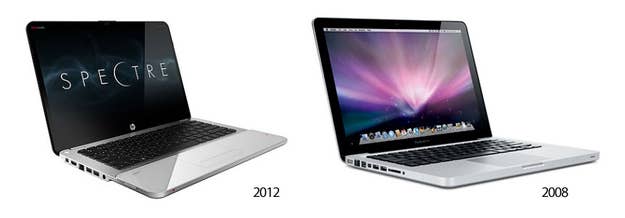
Vizio, the company best known for building those weird glowing walls in the back of Walmart and Costco, is making PCs now. You might expect those computers to be cheap models designed to line the shelves just off to the side of the TV wall. Not machines described as a "beautiful sci-fi fleet." But people are in fact losing their shit over laptops made by Vizio.
I'll tell you why in a sentence: They're well-designed PCs that don't look and feel like ripoffs of Apple products, don't come with any bloatware and are relatively inexpensive. That's it. Really. This, though, makes them special.

It's easy to talk about the moribund state of PCs: HP, the biggest PC maker in the world, talked about selling off its PC business; number two three* Dell publicly says it's "not really a PC company anymore"; even the current flood of "ultrabooks" isn't the result of breakneck innovation at PC companies so much as it is a trough of $300 million Intel laid out to get them to make machines like the MacBook Air. It's probably more fair to talk about the commoditization of PCs and the parts that make them up, though.
Something similar happened in televisions. Just look at Sony and Sharp since HDTVs have become mere commodities, not luxury items. (Together they lost over $11 billion for the year.) Sony is, you know, Sony. It doesn't deal in commodities, or know how to deal in them, rather. It wants to "slow the race to the bottom," in the words of Phil Molyneux, its president of U.S. electronics. Vizio, though, is very good at dealing in commodities — it's the number one LCD TV maker in the U.S. Vizio founder William Wang even told Inc., "We're here to make innovative technology a commodity." You can see why Vizio can't wait to get into PCs, which are now lower and lower margin commodities, like televisions. That's where Vizio thrives.
With flat or shrinking profits from computers, PC makers now produce roughly one interesting computer a year. Dell's carbon fiber-assed XPS 13. HP's glass-topped Spectre 14. Asus's Zenbook UX31. The rest are a black ocean of awfulness. Vizio's PCs, starting at $900, are built to float just above that ocean — oddly enough keeping them from being pure commodity PCs — but sit just below Apple's computers. "We're not even trying to compete with Apple,” Vizio's CTO tells The Verge, since the "gap in the market is premium Windows consumers."
There is nothing innovative in Vizio's PCs. Nothing that's brand new or never been done before, technologically or otherwise — Intel chips, aluminum unibody, flash storage, buttonless trackpad — they're just perfectly good PCs. But nowadays, and probably for as long as laptops continue to be a thing we buy, that's enough to be special.
*Correction: Originally used U.S.-based PC shipments.
